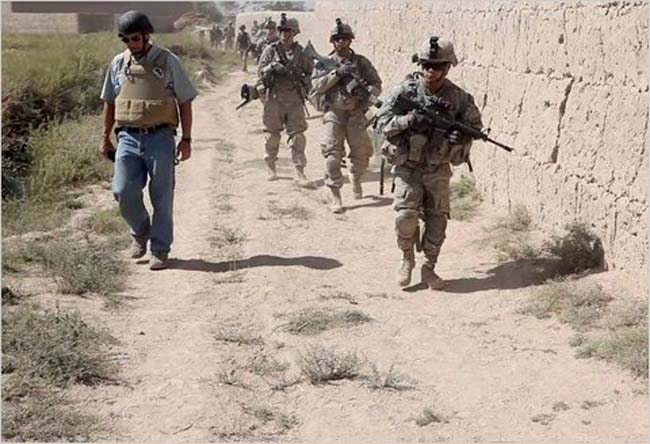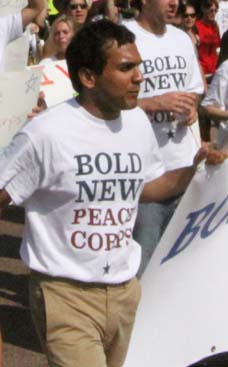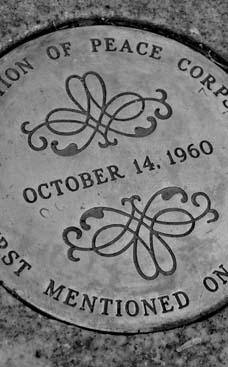
He arrived at one of his first meetings with a convoy of 5 trucks and about 15 American soldiers, because it was too dangerous for him to travel unprotected. A group of farmers listened patiently to his pitch, but afterward, one of them approached Mr. Imerman and told him not to bring any soldiers the next time. "If they see you coming with all these soldiers, the Taliban will mark this field as a target, and then we all are going to suffer," the farmer told him. Since he could not travel without security, the project was scrapped. He had come to talk to farmers about planting winter wheat along the main road. The meeting started amicably enough. But within minutes, the local representative for the Afghanistan Ministry of Agriculture became anxious. Couldn't the farmers take photographs and measure the fields themselves, then meet with Mr. Imerman somewhere else? The soldiers were making the farmers nervous. The ministry officials - but not the farmers - agreed to meet with Mr. Imerman at the local police compound, where the American soldiers were based, on the following day. Then Mr. Imerman packed up and left. While serving in the Peace Corps in the Philippines in the 1980s, he said, "some of the best meetings I ever had with farmers was when you sit down under a shade tree and just talk with them. No agenda, just sit and talk. And you can't do that here."
Phillipines RPCV Eric Imerman is teaching agriculture in Afghanistan's northern province of Kunduz
Afghanistan: Change You Can't Sit and Talk About
By JAMES DAO
Caption: The First Battalion, 87th Infantry travels with Eric Imerman, left, who is teaching agriculture in Afghanistan's northern province of Kunduz.Damon Winter/The New York Times The First Battalion, 87th Infantry travels with Eric Imerman, left, who is teaching agriculture in Afghanistan's northern province of Kunduz.
Af-Pak Photo: Damon Winter/The New York Times
CHAHAR DARA, Afghanistan - When President Obama gave his major speech on Afghanistan a year ago, he called not only for sending an additional 30,000 American troops to the war, but also for expanding the role of civilian experts in rebuilding the nation's shattered government and economy. A new policy was born: "the civilian surge."
Scores of experts in farming, banking, judicial issues and small-business creation were recruited and sent to a civilian boot camp in Indiana intended to simulate a war-scarred Afghan city.
KunduzThe New York Times
A handful wound up in the northern province of Kunduz, a lush region of wheat, rice and cotton farms that is also a strategic gateway to Central Asia. One of them was Eric Imerman, a former Peace Corps volunteer and agriculture expert, whose experiences in Kunduz say much about the uphill struggle facing the surge.
Mr. Imerman, 55, arrived in Kunduz in February. Though the province was considered less violent than the south, one of his first trips off the base ended in a firefight where he was called upon to feed ammunition to a machine gunner.
Over the coming months, he began meeting with farmers and provincial agriculture officials, trying to start demonstration projects intended to improve farming techniques as well as show residents that the government of President Hamid Karzai was trying to improve their lives.
Fear of the Taliban
He arrived at one of his first meetings with a convoy of 5 trucks and about 15 American soldiers, because it was too dangerous for him to travel unprotected. A group of farmers listened patiently to his pitch, but afterward, one of them approached Mr. Imerman and told him not to bring any soldiers the next time.
"If they see you coming with all these soldiers, the Taliban will mark this field as a target, and then we all are going to suffer," the farmer told him. Since he could not travel without security, the project was scrapped.
I met Mr. Imerman under similar circumstances when he visited Chahar Dara, possibly the most restive district of Kunduz province, in September.
He had come to talk to farmers about planting winter wheat along the main road. The meeting started amicably enough. But within minutes, the local representative for the Afghanistan Ministry of Agriculture became anxious. Couldn't the farmers take photographs and measure the fields themselves, then meet with Mr. Imerman somewhere else? The soldiers were making the farmers nervous.
The ministry officials - but not the farmers - agreed to meet with Mr. Imerman at the local police compound, where the American soldiers were based, on the following day. Then Mr. Imerman packed up and left.
While serving in the Peace Corps in the Philippines in the 1980s, he said, "some of the best meetings I ever had with farmers was when you sit down under a shade tree and just talk with them. No agenda, just sit and talk. And you can't do that here."
Illiterate and Innumerate
Later that same day, Mr. Imerman ventured into the fields directly adjacent to the heavily fortified police headquarters, considered the only secure neighborhood in the district. And there, another obstacle to improving farm production became apparent: the rudimentary nature of local farming techniques.
On one plot, a sharecropper was harvesting mung beans from government-owned land. The farmer and about five of his children were trying to dislodge beans from their stems using brooms, and they seemed to be missing many of them. A few hundred yards away, farmers in another plot chopped at plants using handmade sickles.
Few farmers here use machines, and many do not use fertilizer or pesticides. When they do, they often apply the wrong amounts because they lack the ability to accurately measure their fields. When they guess, Mr. Imerman said, they often apply too much fertilizer, which burns the plants, or too little, which achieves nothing.
Mr. Imerman, a child of Iowa farm country, said he had grappled with premodern farming techniques before while in the Peace Corps. But Afghanistan is particularly frustrating, he said, because so few farmers are literate. Many do not know how to add. And to make matters worse, some farming skills seems to have been lost during 30 years of war.
For instance, he said, local farmers don't use trestles for their grapes, though he believes that they once did. As a result, the grapes are more susceptible to fungus. A community irrigation system also seems to have been destroyed over the course of constant conflict.
Local farmers also seem baffled by the emergence of melon flies, which have destroyed as much as 80 percent of their crop. This region was once the melon capital of Afghanistan, he said, yet farmers seemed clueless about how to use pesticides that might kill the larvae.
The 24-Hour Syndrome
Crisis, he said, has bred what he calls "the 24-hour syndrome." All they can think about, he said, is: "What is my problem today. It doesn't matter that I've got something that I know is a problem coming down the road. It's my problem today that I want solved."
But perhaps the biggest problem he said he faced was a culture of dependency among Afghan farmers. Many farmers expect to be given something - machinery, fertilizer, feed or pesticides. But they do not want to learn better farming techniques, he said.
"As far as development goes, just giving something to someone is, to me, failed development," Mr. Imerman said.
When he met again with agricultural officials and farmers in Chahar Dara, they agreed to do a demonstration project next to the police headquarters. It was a start. But to see real progress, Mr. Imerman said, he will have to stay beyond his one-year contract. He increasingly expects to do just that.
Divorced and with a daughter in college, Mr. Imerman signed up for this adventure after losing his job to state budget cuts in Ohio, where he worked for Ohio State University doing development projects in rural areas.
His goal is to achieve in Kunduz what he did in the Philippines, where he helped a rice farmer build a simple thresher that increased production by 20 percent. Within a few years, every farmer in the area had one of the devices and all were living better.
But doing that requires developing the trust of at least one farmer. "If we can show that ‘if you do this, this and this, we can increase your production from 300 kilos to 1,000 kilos,' then hopefully everybody will adopt it," he said.
"I'm hoping that works here. But we'll see."















